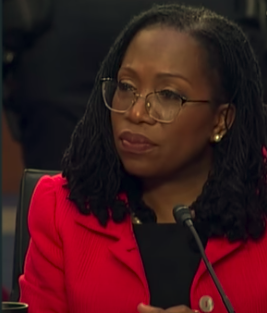After 12 hours of testifying before the Senate Judiciary Committee on Tuesday night, Judge Ketanji Brown Jackson, the first Black woman nominated to the U.S. Supreme Court, was questioned by Sen. Alex Padilla (D-CA) on voting rights and tribal sovereignty.

Judge Jackson is a Harvard graduate and a former public defender. If confirmed, she will be the first public defender on the Supreme Court. However, if confirmed, the ideological balance of the Supreme Court won't be changed; it will stay six conservatives to three liberal justices.
When confirmed, Judge Jackson will potentially be taking the place of the retiring Justice Stephen Breyer who she worked for early in her career.
Sen. Padilla questioned Jackson on what she believes the role the judicial branch plays in upholding the fundamental right to vote. He explains how when he was California’s Chief Election Officer, it was his job to ensure safe, secure, and high participation in elections.
“Can you just share for a couple of minutes what you believe the role or responsibilities [of the] Supreme Court might be in protecting this fundamental right to vote and by extension, our democracy?” Padilla asked Jackson.
Want more Native News? Get the free daily newsletter today.
Judge Jackson asserts that the right to vote is protected by the Constitution saying:
“The Constitution makes clear that no one is to be discriminated against in terms of their exercise of voting. And the Congress has used its constitutional authority to enact many statutes that are aimed at voting protection. There are also laws that relate to ensuring that there is not only voting access, but ensuring that that isn't fraud in terms of voting.”
She continues, “These concerns are embodied by various laws and provisions, and there are disputes at times over the concerns in the balances that are being made across the country relating to the exercise of voting, and those disputes come to court and then eventually to the Supreme Court that interprets the laws that pertain to the to the fundamental right to vote, which, as you say the Supreme Court has acknowledged is a fundamental right.”
After being questioned on voting rights, Senator Padilla moves on to the question of the importance of upholding tribal sovereignty. He asks: “As a general matter, can you share what your understanding is of the federal government's legal and moral trust, responsibility, and relationship with tribal governments?”
In Judge Jackson’s response, she reaffirmed the already pre-established sovereignty of tribal governments.
“Yes, Senator. It is established in the law, the Supreme Court has established, that there is a special trust relationship between Indian tribes and the federal government,” Judge Jackson responded. “Indian tribes are, as a general matter, considered to be sovereigns, and the relationship is a sovereign-to-sovereign relationship, but it's one in which the federal government has some responsibilities related to the Indian nations, and it's a very, very important care and trust responsibility that the federal government has in terms of making sure that the tribes are recognized and cared for, in the context of our system.”
The full 30-minute questioning can be found here.
More Stories Like This
50 Years of Self-Determination: How a Landmark Act Empowered Tribal Sovereignty and Transformed Federal-Tribal RelationsMashantucket Pequot Tribal Nation to Host Puneesuwak “Honoring” Our Veterans Event
Lumbee Recognition Debate Rekindled in Senate Hearing
Senate Committee on Indian Affairs to Hear Testimony on Lumbee Tribe Federal Recognition Bill
Ghosts Suppers - Part of Odawa Tradition and Culture Still Alive
Help us tell the stories that could save Native languages and food traditions
At a critical moment for Indian Country, Native News Online is embarking on our most ambitious reporting project yet: "Cultivating Culture," a three-year investigation into two forces shaping Native community survival—food sovereignty and language revitalization.
The devastating impact of COVID-19 accelerated the loss of Native elders and with them, irreplaceable cultural knowledge. Yet across tribal communities, innovative leaders are fighting back, reclaiming traditional food systems and breathing new life into Native languages. These aren't just cultural preservation efforts—they're powerful pathways to community health, healing, and resilience.
Our dedicated reporting team will spend three years documenting these stories through on-the-ground reporting in 18 tribal communities, producing over 200 in-depth stories, 18 podcast episodes, and multimedia content that amplifies Indigenous voices. We'll show policymakers, funders, and allies how cultural restoration directly impacts physical and mental wellness while celebrating successful models of sovereignty and self-determination.
This isn't corporate media parachuting into Indian Country for a quick story. This is sustained, relationship-based journalism by Native reporters who understand these communities. It's "Warrior Journalism"—fearless reporting that serves the 5.5 million readers who depend on us for news that mainstream media often ignores.
We need your help right now. While we've secured partial funding, we're still $450,000 short of our three-year budget. Our immediate goal is $25,000 this month to keep this critical work moving forward—funding reporter salaries, travel to remote communities, photography, and the deep reporting these stories deserve.
Every dollar directly supports Indigenous journalists telling Indigenous stories. Whether it's $5 or $50, your contribution ensures these vital narratives of resilience, innovation, and hope don't disappear into silence.
 The stakes couldn't be higher. Native languages are being lost at an alarming rate. Food insecurity plagues many tribal communities. But solutions are emerging, and these stories need to be told.
The stakes couldn't be higher. Native languages are being lost at an alarming rate. Food insecurity plagues many tribal communities. But solutions are emerging, and these stories need to be told.
Support independent Native journalism. Fund the stories that matter.
Levi Rickert (Potawatomi), Editor & Publisher

